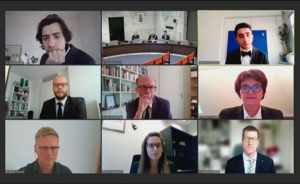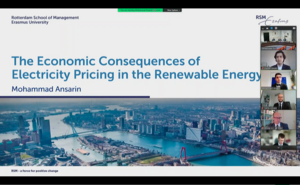PhD Defence Mohammad Ansarin

In his dissertation Mohammad Ansarin detailed the influence of growing D-RES on the equity and economic efficiency of electricity tariffs. Newer time-based pricing schemes are necessary to prevent high (and probably undesirable) inefficiency and inequity within and between household populations. Installing smart meters is a prerequisite for these tariffs. Using extra meters at the generation resource simplify paying for D-RES generation, but the improvements for inequity are comparatively small. Mohammad defended his dissertation on Thursday, 14 October at 15:30h. His Supervisors were Prof. Wolfgang Ketter (RSM) and Dr Yashar Ghiassi-Farrokhfal (RSM). The members of the Doctoral Committee were Prof.dr.ir. Eric van Heck (RSM), Dr Ronald Huisman (ESE), Prof.dr.ir. Zofia Lukszo (TU Delft), Dr Konstantina Valogianni (IE Business School), and Dr.ir Laurens de Vries (TU Delft).
About Mohammad Ansarin

Mohammad Ansarin studies economics in the energy system. His research spans many categories, including equity and efficiency in retail electricity pricing, agent-based modelling of electricity systems, matching of solar generation and electric vehicle charging, competitive retail electricity market dynamics, energy storage systems, and sustainable urban heating systems. His research is inspired by practice, and he places great emphasis on applying empirical reasoning in real-world settings. His research has been presented and published at numerous conferences, seminars, and journals. He is currently a post-doctoral researcher at the Rotterdam School of Management, Erasmus University (Netherlands).
Mohammad has taught classes across a diverse set of courses and programs, supervised master’s theses, presented and lectured for different audiences, and co-wrote business case studies. He has also represented PhD candidates in RSM's Faculty Council for 4 years and assumed vice-chair duties for 2 years. Since 2013, he has served as a reviewer for various academic conferences and journals.
Mohammad previously completed a BSc degree in mechanical engineering from Sharif University of Technology (Tehran, Iran) and an MSc degree in biomedical sciences and engineering from Koc University (Istanbul, Turkey).
Thesis Abstract

Policymakers create incentive schemes to encourage uptake of distributed renewable energy resources (D-RES) by smaller electricity users to replace some pollutant generation. These incentives sometimes conflict with the existing economic relationships between retailers and consumers. The tariffs defining these relationships are designed on certain principles, of which equity and economic efficiency are directly impacted by high D-RES growth. This thesis details the influence of growing D-RES on the equity and economic efficiency of electricity tariffs. First, a map of the research into equity is provided in Chapter 2. In Chapter 3, the thesis investigates and separates the role of metering infrastructure and tariffs in creating inequities within household populations. Chapter 4 investigates how growing D-RES installations impacts the efficiency and equity of multiple tariffs. Chapter 5 complements this study by describing the economic inefficiencies of D-RES remuneration, which cause over- or under-installations of D-RES. Newer time-based pricing schemes are necessary to prevent high (and probably undesirable) inefficiency and inequity within and between household populations. Installing smart meters is a prerequisite for these tariffs. Using extra meters at the generation resource simplify paying for D-RES generation, but the improvements for inequity are comparatively small. This thesis provides insights for businesses and policymakers in the energy industry, particularly those involved with D-RES.


